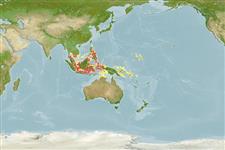Elasmobranchii (sharks and rays) >
Orectolobiformes (Carpet sharks) >
Hemiscylliidae (Bamboo sharks)
Etymology: Hemiscyllium: hemi-, from hemisys (Gr.), half, presumably referring to similarity and/ or close affinity to Scyllium (=Scyliorhinus, now in Scyliorhinidae) and/or Chiloscyllium; skylion, Greek for dogfish or small shark (See ETYFish); henryi: In honor of underwater photographer Wolcott Henry, who supported Conservation International’s marine initiatives, including the taxonomy of western New Guinea fishes (See ETYFish).
Eponymy: Wolcott Henry is a professional underwater photographer who is based in Washington DC. [...] (Ref. 128868), visit book page.
Environment: milieu / climate zone / depth range / distribution range
Ecology
Marine; reef-associated; depth range 3 - 30 m (Ref. 74956). Tropical
Western Pacific: Known only from western New Guinea (Papua Barat Province), Indonesia.
Size / Weight / Age
Maturity: Lm ? range ? - ? cm
Max length : 78.3 cm TL male/unsexed; (Ref. 74956); 81.5 cm TL (female)
Short description
Identification keys | Morphology | Morphometrics
This species is distinguished by its unique colour pattern, distinctive is the combination of small scattered spots on the head, body and fins including 13-18 spots on the interorbital/dorsal snout region and 6-18 spots on dorsal surface of pectoral fins; a unique 'double-ocellus' marking on middle of side, just behind the head (Ref. 74956).
Observed and collected both in the bay and at nearby Selat Iris, a narrow channel between the mainland and Aiduma Island; where there is almost no shallow, fringing reef habitat due to the unique geomorphology. Thus, the typical habitat for this species extends into deeper water (at least 30 m), although it has also been sighted in depths less than 4 m. It is often seen resting on the bottom, occasionally observed slowly swimming or 'walking' over the bottom with the pectoral and pelvic fins. Generally sedentary during the day, sheltering under rocky outcrops or tabular corals (Ref. 74956).
Life cycle and mating behavior
Maturity | Reproduction | Spawning | Eggs | Fecundity | Larvae
Allen, G.R. and M.V. Erdmann, 2008. Two new species of bamboo sharks (Orectolobiformes: hemiscylliidae) from Western New Guinea. aqua, Int. J. Ichthyol. 13(3-4):93-108. (Ref. 74956)
IUCN Red List Status (Ref. 130435: Version 2024-2)
Threat to humans
Harmless
Human uses
Tools
Special reports
Download XML
Internet sources
Estimates based on models
Phylogenetic diversity index (Ref.
82804): PD
50 = 0.5020 [Uniqueness, from 0.5 = low to 2.0 = high].
Bayesian length-weight: a=0.00398 (0.00176 - 0.00901), b=3.09 (2.89 - 3.29), in cm total length, based on LWR estimates for this (Sub)family-body shape (Ref.
93245).
Trophic level (Ref.
69278): 3.5 ±0.3 se; based on size and trophs of closest relatives
Fishing Vulnerability (Ref.
59153): Moderate to high vulnerability (53 of 100).
